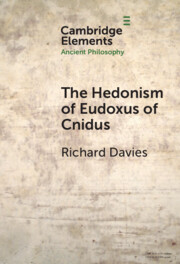Element contents
The Hedonism of Eudoxus of Cnidus
Published online by Cambridge University Press: 27 November 2023
Summary
- Type
- Element
- Information
- Series: Elements in Ancient PhilosophyOnline ISBN: 9781009321532Publisher: Cambridge University PressPrint publication: 21 December 2023
References
Primary Sources
Secondary Sources
- 2
- Cited by



